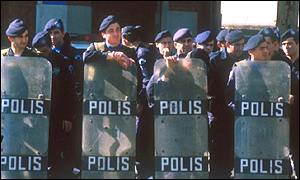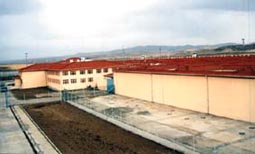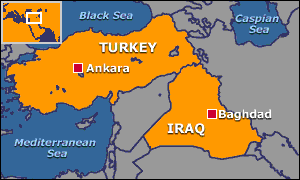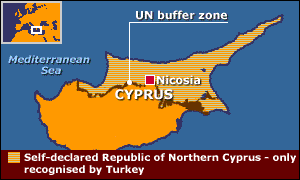21
January 2002
![]()
1. "Turkish police detain 100 over Kurdish-language demo", police in Istanbul rounded up around 100 people who were planning to hold a demonstration on Sunday to have the Kurdish language taught in highschools, the Anatolia news agency reported.
2. "Turkey eases jail conditions, but end of hunger strike not expected", Turkey's justice minister on Friday authorised inmates in new high security prisons to meet and socialize in an apparent bid to end a deadly hunger strike protesting the jails, Anatolia news agency reported.
3. "The Fears of a Muslim Ally", Turkey doesn't want to prove its worth to the West by fighting a war with neighboring Iraq.
4. "Analysis: Turkey and the Iraqi Kurds", the two main parties controlling the Kurdish region of Iraq have ruled out any plans to establish an independent Kurdish state.
5. "Old friends hold key to peace in Cyprus", island prays for reunion deal as EU deadline approaches
6. "Turkey - U.S. and Terror", columnist Ferai Tinc writes on the different stances of the US and the EU on the fight against terrorism.
1. - AFP - "Turkish police detain 100 over Kurdish-language demo":
ANKARA
Police in Istanbul rounded up around 100 people who were planning
to hold a demonstration on Sunday to have the Kurdish language taught
in highschools, the Anatolia news agency reported. Acting on a tip-off
that a demonstration was going to be held in front of a mosque in the
Eminonu district on the city's European side, dozens of officers deployed
in the area, backed up with police dogs and armoured vehicles, the report
said.
Police arrested some 20 people who had gathered in the area, while some 80 other people suspected of planning to attend the protest were taken into custody at police check-points in other parts of the city, it added. The protest comes as part of a recent campaign to have Kurdish language education introduced in universities and schools -- something which is currently banned under Turkey's constitution. The campaign initially started in Istanbul universities in November where hundreds of Kurdish students signed petitions to have Kurdish taught, and then spread to universities across the country.
It has recently spilled to highschools, where parents have submitted similar petitions to the education ministry. Turkish authorities view the campaign as a sign of Kurdish separatism and claim that the Kurdistan Workers Party (PKK), which waged a 15-year campaign for Kurdish self-rule in southeast Turkey, was behind the movement. According to Turkey's main pro-Kurdish party, the People's Democracy Party (HADEP), more than 5,000 people -- among them university students, parents and HADEP members -- have been detained in a police crackdown on campaigners.
The Kurdish language has been legally banned in Turkey
for a long time, even though authorities have long tolerated a series
of magazines and music cassettes in Kurdish. Last year, the Turkish
parliament approved a constitutional amendment which paves the way for
the country's Kurds to broadcast and publish material in their mother
tongue. But education in the Kurdish language is still ruled out over
fears that such a move could fan Kurdish separatism and lead to the
break-up of Turkey. ![]()
2. - AFP - "Turkey eases jail conditions, but end of hunger strike not expected":
ANKARA
Turkey's justice minister on Friday authorised inmates in new high
security prisons to meet and socialize in an apparent bid to end a deadly
hunger strike protesting the jails, Anatolia news agency reported.
But human rights activists said conditions attached to the easing of semi-solitary confinement in the jails had already been rejected by organisers of the hunger strike, which has claimed 45 lives. Scores of prisoners and their supporters have been starving themselves in protest at the introduction of the new jails, in which small cells for one to three inmates replaced large dormitory accomodations. Prisoners and prisoner rights activists say the smaller cells leave inmates isolated and more vulnerable to abuse while authorities say the dormitory system promoted frequent protests and prison uprisings.
Justice Minister Hikmet Sami Turk said in a circular that inmates who participate in recreational activities arranged by jail officials would be able to meet and chat in groups of 10 people at most for five hours a week, Anatolia reported. But Husnu Ondul, the head of the Human Rights Association (IHD), said: "The decision is not likely to have any impact because the inmates have already refused to take part in the recreational activities organized by jail authorities."
Out of some 2,000 inmates in the controversial new jails, which triggered the strike in October 2000, only about a dozen have agreed to join such activities, he said. "I do not expect any prisoners to apply to benefit from this arrangement," Ondul said. The government has categorically ruled out a return to the dormitory system, arguing that the packed compounds had become strongholds for criminal groups, which frequently rioted and took prison officials hostage. Inmates in the new prisons have so far been allowed to leave their cells and socialize with fellow prisoners in recreational areas only during activities arranged by prison administrations.
Turk recently rejected a proposal from barristers to open doors between three cells to allow prisoners to talk to each other throughout the day. The hunger strike has taken the lives of both prisoners and outside supporters of the movement. In addition to the 45 victims who died of hunger, four inmates have burned themselves to death in support of the strike and another four people died last November in a police raid on an Istanbul house occupied by hunger-strikers.
The movement also saw 30 prisoners and two soldiers killed
in clashes during raids by security forces on 20 prisons in December
2000. About 130 inmates continue to fast, according to IHD figures.![]()
3. - Newsweek - "The Fears of a Muslim Ally":
Turkey doesn't want to prove its worth to the West
by fighting a war with neighboring Iraq
TURKEY SHATTERS THE conventional image of Islam. It is 99 percent
Muslim and yet resolutely secular, democratic and pro-Western. And these
are not attitudes held only in Istanbul salons. Seventy-five percent
of the country is in favor of joining the European Union. Popular attitudes
are generally pro-American. Since September 11 we've all heard dozens
of instant experts explain that in Islam, religion and politics can
never be separated. Well, Turkey's done it for seven decades.
But despite September 11, the Turkish establishment is currently obsessed about something else: Europe. Over the past three years, the European Union has made some encouraging noises about Turkey's potential to become a member. It has caused a quiet revolution in the country. The government-despite being a weak multiparty coalition-has been steadily pursuing significant economic and political reforms for a year. In October 2001, the Turkish Parliament passed 34 of 37 proposed amendments to the 1982 Constitution to bring it more in line with European Union standards. (Interestingly, the Islamic parties are now in favor of EU membership because they realize that their freedom of expression would be better guaranteed by European courts than Turkish generals.) Even on the decades-long impasse over Cyprus, Ankara is inching toward a negotiated solution. "For Turkey, EU membership would be the culmination of Ataturk's dream: to catch up with civilization," said Sukrit Elektar, one of Ankara's veteran diplomats.
The road to the West has cleared up since September 11. Now Turkey is important as a modern Muslim country, but more crucially because of its geopolitical location and heft-a major power straddling Europe, the Middle East and Asia, with easy access to all the major oil lands. "It's as if a magic wand has tapped Turkey," says former foreign minister Emre Gonensay.
But its location has also produced its greatest headache: Iraq. "Every time we hear that Washington wants to intervene in Iraq, I want to say, think twice, think three times, and then think again," says Cevik Bir, former deputy chief of the armed forces. "If there is a war, it is impossible that Iraq will hold together."
Turkey's nightmare is not that an invasion of Iraq will produce an independent Kurdish state on its southern border. "That's not an option," a senior source close to the military explained. The nightmare is that the Army would be forced to preclude that option by occupying northern Iraq. (With 12 percent of its population Kurdish and having battled a terrorist movement for decades, Turkey believes that Kurdish self-determination even across the border would mean the end of the nation's unitary existence.) There are already contingency plans for such an operation in Ankara. "If there is an American intervention," this source told me, "we would have to watch and see whether the Kurds began rising up in northern Iraq-and they likely will. We would be forced to make sure that once the war ends we are in a military position to affect the political settlement that follows. It's a last resort, but we have to be masters of our own fate."
Washington has told Ankara that it supports the principle that Iraq should remain one nation. Many Turkish generals don't believe it. They think that once the war begins, all bets are off. The Iraqi Kurds have been the chief opposition to Saddam Hussein for a decade. Were they to declare independence, the United States would not crush them. We're for self-determination, remember? As a result, Turkey wants assurances that no Afghan-style operation-bombing plus reliance on local forces-will be attempted. (In such a scenario, the Kurds would play the role of the Northern Alliance and thus would become the victors.) A senior military officer observed that if 500,000 American troops were required to evict Saddam from Kuwait, then surely the much larger task of occupying Iraq would require at least as many American troops.
An American intervention in Iraq would hit Turkey hard economically-as it did during the gulf war. It would also take the focus of the country away from economic and political modernization. Economic reforms, political reforms and human-rightsissues would all take a back seat to the life-and-death problems of national sovereignty. "The gulf war set us back for almost a decade," said General Bir. "Now as we are moving forward, this would create new problems. We would become obsessed for years with all the security problems it would create."
There are good arguments for intervention in Iraq. If
successful, a democratic or at least friendly Iraq would ease tensions
in the region and might even transform its geopolitics. The status quo,
with Saddam Hussein and his weapons intact, is not that stable anyway.
But for Turkey the stakes are very high. For years it has dreamed that
its key strategic location will bring it inexorably closer to the West.
Now it has, but that same geography could thrust Turkey way off course.
That's as close to Greek tragedy as geopolitics gets. ![]()
4. - BBC - "Analysis: Turkey and the Iraqi Kurds":
By the BBC's Hiwa Osman 
The two main parties controlling the Kurdish region of Iraq have
ruled out any plans to establish an independent Kurdish state.
Turkey is concerned that an independent Kurdish state in Iraq would encourage its large Kurdish population, who do not have cultural and linguistic rights, to call for a state of their own.
But in a joint statement, the Kurdistan Democratic Party (KDP) and the Patriotic Union of Kurdistan (PUK) said that they "categorically reject baseless and provocative accusations" that they were planning an independent state and understand the "legitimate concerns of neighbouring countries, especially of Turkey".
Ruling out any plans for separation, the Kurdish parties said: "We advocate a democratic and federal solution for the Kurdish issue and we support Iraq's territorial integrity."
Security safeguard
Turkey provides valuable access for the landlocked Iraqi Kurds to the outside world and hosts the American air base that protects the no-fly zone in northern Iraq.
In return, the Kurdish parties, who have been governing the area south of Turkey's border with Iraq since 1991, have been trying to maintain good neighbourly relations with Turkey.
"It is our primary duty to safeguard the security of our borders and the stability in the region," the joint statement added.
In performing this "duty", Iraqi Kurds have prevented Turkey's main Kurdish rebel party, the PKK, from operating in their area. This has involved armed clashes and allowed the Turkish army to enter their region to pursue the PKK.
Fragile economy
Another mutual benefit of this uneasy partnership is the relatively stable trade across the border. Shops in the Iraqi Kurdish region are stacked with Turkish products brought by trucks that return to Turkey with cheap Iraqi fuel.
While playing the role of a key US ally in the region, Turkey also enjoys good commercial and diplomatic ties with Baghdad.
Over the past year, talks on boosting trade and improving diplomatic relations between the two countries have increased as Turkey has sought ways to bolster its fragile economy.
If the US-led campaign against terrorism extends to Iraq, Turkey will have a key role to play, as it will provide a northern military base. But Turkey is wary of the consequences of such an attack.
In addition to its concerns over the disintegration of Iraq and subsequent establishment of a Kurdish state, it will be difficult for Turkey's troubled economy to withstand a war on its border as it will affect its trade with the Kurds and with Baghdad.
The Iraqi Kurds are keen to appease Turkey's border security concerns. "Over the past 10 years, we've worked closely with Turkey to address its border security concerns," KDP's foreign relations chief, Hoshyar Zebari told the BBC. "Turkey is a valuable neighbour."
This valued-neighbour status that Turkey enjoys with the Iraqi Kurds may not be the same if Baghdad takes control of the Kurdish area.
The current state of affairs seems convenient for the
Turks, as they enjoy stable political and economic ties with the US,
Baghdad and the Iraqi Kurds. ![]()
5. - The Guardian - "Old friends hold key to peace in Cyprus":
Island prays for reunion deal as EU deadline approaches
NICOSIA / by Helena Smith
Stella Patsalides was not thinking much about her work, her home,
or her husband or her cats last week. Instead her mind was on green
pastures she has not seen for 27 years.
The Greek Cypriot spent much of her time running round Ministries making sure that a prime tract of land in Nicosia, the world's last partitioned capital, was registered in her name.
Ever since the Turkish invasion, which followed an Athens-backed coup attempting to unite the island with Greece, she has been living only miles away from her former home, which ended up on the Turkish side. In practical terms, it might as well have been on the moon.
But last week, along with many others in Cyprus's divided population, she had a bolt from the blue: at long last she might be able to go back.
'Now that I've put my business in order,' she says, 'I suppose I am going to have to make a mental shift. If we move back to the north it's going to be like moving to the Wild West.'
After more than a quarter of a century of abortive diplomacy, a solution to the West's longest-running dispute is looming - perhaps by June - thanks to the two ageing rivals who have dominated the island's often bloody politics since it won indepen dence from Britain in 1960.
In a remarkable turnaround, President Glafcos Clerides,
who heads the internationally recognised Greek Cypriot republic in the
south, and Rauf Denktash, the Turkish Cypriot leader, declared that
they would be engaging in 'intensive' peace talks. 
The UN-brokered negotiations, the first face-to-face talks in more than
four years, begin in earnest tomorrow.
All along the UN-patrolled 'dead zone' that divides the island, crumbling buildings, rusty gunports, sentry boxes and overgrown minefields are reminders of the stalemate that kept the island divided.
On both sides, but particularly in the internationally isolated, impoverished north, the restart of talks has been greeted with thinly disguised euphoria. A potent combination of age, fading health and geopolitical circumstance has injected the search for a settlement with unprecedented urgency.
Cyprus is heading for European Union accession at the end of the year. Although a solution has been dismissed as a precondition for entry, mandarins in Brussels are said to be having 'palpitations' at the prospect of the bloc's borders ending at a barbed-wire fence.
If Cyprus joins without a solution, Ankara has vowed to annex Denktash's break away republic - a threat that could lead to war between Greece and Turkey, the island's two rival Nato motherlands.
Menacingly, Greece has said it will veto the European Union's long-awaited enlargement if Cyprus fails to get in.
Denktash, 77, and dogged by diabetes, called his meeting with 83-year-old Clerides 'our last tango'. Clerides, who has stated that he will leave politics when his term expires next year, concurs. 'This may be our last chance to agree,' he lamented after meeting the Turkish-Cypriot leader last Wednesday at the abandoned Nicosia airport.
Forging a loose 'bi-zonal, bi-communal federation' - as laid out by the UN - will not be easy. The two men will have to grapple with issues at the very heart of the Cyprus problem, starting with the right of return for 200,000 Greek Cypriot refugees and the question of security for Turkish Cypriots, who form 18 per cent of Cyprus's population but control 37 per cent of its territory.
Neither wants to put their name to a settlement that would replicate the plight endured by the Palestinians and Israelis. However, all agree that no two politicians are better placed to clinch a deal.
The two men, both scions of long-established Nicosia lawyer families, are blessed with the moral standing to sell a solution to their peoples. Moreover, even though they first crossed swords in a British colonial court in 1950, they find it hard to conceal a friendship dating back five decades.
'They clearly get along very well and are at ease with each other,' Alvaro De Soto, the UN diplomat brokering the talks, told The Observer. 'This is an asset for the prospect of negotiations between them.'
Clerides and Denktash, whose previous refusal to engage in talks made him the butt of angry criticism, want to go down in history as the architects of a solution.
However, Cypriots across the ethnic divide have a lot of mental catching up to do. With each passing year the scar tissue of the wound that splits the island hardens. 'My generation don't even know what the Turkish Cypriots are like,' said Efi Parla, a social worker in her mid-twenties. 'We're living on borrowed memories that we hear from our parents, who seem to loathe them.'
Clerides and Denktash should take heart that, in some
cases, separation seems to have bred more curiosity than hatred. ![]()
6. - Hurriyet - "Turkey - U.S. and Terror":
 Columnist
Ferai Tinc writes on the different stances of the US and the EU on the
fight against terrorism. A summary of her column is as follows:
Columnist
Ferai Tinc writes on the different stances of the US and the EU on the
fight against terrorism. A summary of her column is as follows:
"A tension has been seen recently between both sides of the
Atlantic due to the EU's failure to include the terrorist organizations
in Turkey in their list of terrorist organizations. 
The US is launching intiatives in European capitals on the issues. Differences
of opinion on the definition of terrorism have led to serious discussions.
An official attending the program organized by the Turkish Atlantic
Council stated that if there were no agreement on the definition of
terrorism, there could be no struggle against international terrorism.
There are interesting explanations as to why the PKK or the DHKP-C were
not cited in the EU terrorist organizations list. European officials
are saying that they are being threatened by these organizations. If
these organizations were included on the list, they claim fear that
incidents might occur which could create instability in Europe.
Leaving this unconvincing excuse aside, let's take a look
at the countries which are opposed to including these organizations
in the list, namely, Italy and Greece. The Greek government is already
in hot water due to allegations that it has relations with the Nov.
17 terrorist organization and therefore, it is rather hard for it to
define another organization caught in its own hands as terrorist.
The Italian stance is also interesting. Back when the PKK head Ocalan
was hiding in Rome, current Prime Minister Berlusconi, the opposition
leader at the time, brought forward motions to expel Ocalan from the
country, and asked that Turkey's requests be taken into consideration.
However, today Berlusconi's policy has turned 180 degrees. Turkey, has
taken on the role of a "lithmus paper" in fight against terrorism.
It has shown that there is no real agreement on the definition
of terrorism within the alliance. For a united fight against terrorism,
there has to be agreement on the definition of terrorism." ![]()